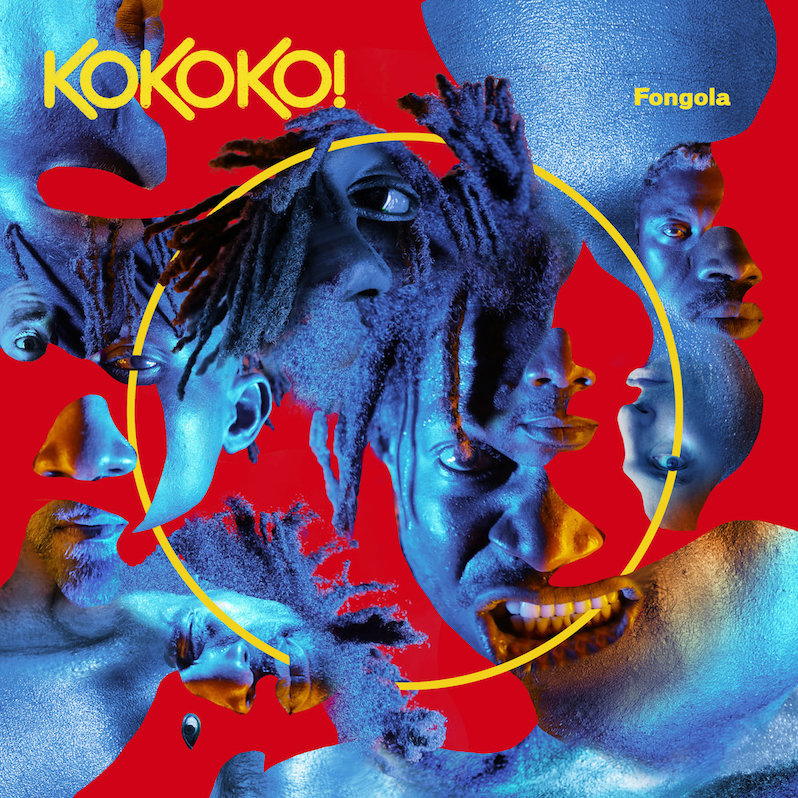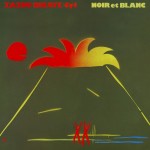KOKOKO! : Fongola

One of the distinct pleasures of following music closely, not letting radio or buzz be the guide of the ear, are the startling discoveries that dot the fabric of the world. More often than not, with but just a little sifting through the rubble, we find that art gently survives in all contexts. A greater question arises, certainly, about archival and dispersal, what art the structural powers of the world consider worthy of preserving and displaying, and those are valid and serious questions, but nonetheless art manifests through people in all places of the world. So it comes as no surprise then that Kinshasa, the third-largest city in Africa (itself the second-largest continent), would have some absolutely incredible music lurking within it, away from Western eyes.
KOKOKO! is a Congolese dance music group. If you google them, you might see references to their homemade instruments and a lot of use of the “lo-fi” tag, and while it’s not wholly inaccurate, it does paint a slightly different picture than the album itself. Beyond the intense colors and harsh cuts of the collagist album cover, the record itself isn’t one of lo-fi limitations giving curious grime and grit to sophisticated compositions but instead is a masterclass in polyrhythmic ideas applied to dance music. KOKOKO! generate deftly layered pulses over top one another (yes, at times with homemade instruments, but also just as often with sequencers and synthesizers). The pieces are developed with these rhythmic seeds at their center, adding and subtracting layers in subtle but powerful ways to subtly shift the alignment of these beat-driven pieces.
It feels ecstatic and joyful, dance music as it’s supposed to be composed and played. It’s not just a steady four-on-the-floor with different synth stabs over top, but they also make sure to include those. It’s just that they also include many other different pulses atop, jagging and tugging at your body until you feel compelled to get up and dance. The vocals along with these tracks add a human emotive edge to the proceedings, feeling at times to be cries of pain and at others cries of pleasure, all married to clever synth beds that are occasionally allowed to propose a clear melodic or harmonic lead concept. The affect on listening is that these pieces are intuitive, generated more by the instinctive gesture of an incredible set of musicians who know both each other’s instincts and the base music ideas deeply well, but investigation shows a million little touches and pivots that demonstrate that a lot of care and wisdom went into the tracks as well.
Which is why referring to an African group using homemade instruments as “primitivist dance music” or even the more acceptable “lo-fi” feels broadly unacceptable. First, obviously, the racial connotations of referring to players from the third largest African city, a metropolis of nearly 12 million people (more than NYC!), with fixation on homemade instruments gives a certain veneer to our perception of them the way that, say, a Brooklynite hipster using homemade instruments wouldn’t. Even the imagining that, by being non-Western, KOKOKO! would be detached from the musical body of dance music of the Western world, from the developments in Chicago and NYC and Detroit to the European schools, makes no sense in the context of the internet. This is not “world music” in some trite and condescending manner but instead worldly music, a set of deeply African players using deeply African rhythmic ideas married deftly, perfectly to dance music concepts that are found now everywhere from Brazil to Japan to India to the Middle East to Europe and America. More importantly: Fongola is a brilliant record, one that will bury its grooves into you and force you to sing and to dance. That ecstatic release, to dance music, is all that matters, and Fongola has it in spades.
Similar Albums:
 Zazou/Bikaye/CY1 – Noir et Blanc
Zazou/Bikaye/CY1 – Noir et Blanc
 Exploded View – Obey
Exploded View – Obey
 Seun Kuti & Egypt 80 – Black Times
Seun Kuti & Egypt 80 – Black Times
Langdon Hickman is listening to progressive rock and death metal. He currently resides in Virginia with his partner and their two pets.

